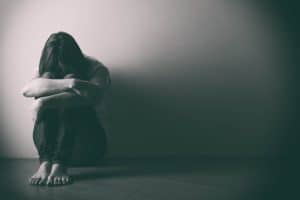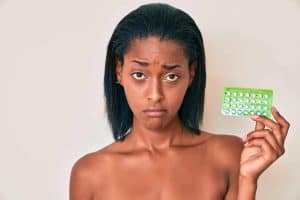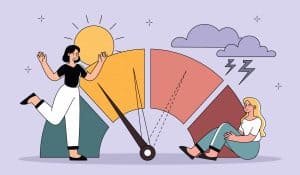Can Birth Control Help Treat Depression?
Depression does not have a single cause, but rather a combination of genetic, biochemical, and environmental factors. Thankfully, there are several treatment options available, and it may take a combination of techniques to help the depressed individual feel better.
For women, in particular, their birth control may play a role in their mental health status. In some cases, it may help alleviate symptoms, but in others, it may exacerbate them. The following article will delve into the relationship between birth control and depression.
[thrive_leads id=’18291′]
What types of depression can birth control treat?
Depression is an incredibly complex disorder – every individual with the disorder may experience it differently. With that being said, there are two types of depression that are particularly common for women:
- Depression – 10-15% of women suffer from depression.
- Premenstrual dysphoric disorder (PMDD) – This disorder typically occurs a few days before a woman starts her period. It may be confused with Premenstrual Syndrome (PMS) because the symptoms are similar. However, PMDD is distinguished from PMS in that the symptoms become so intense that they disrupt the individual’s daily functioning.
While experiencing some negative emotions is a normal part of life, feeling this way all the time may be indicative of a more serious health condition.
What are the symptoms of Depression?
Doctors are taught to look for SIGECAPS:
- Sleep (too much or too little)
- Interest (reduced interest in things that make you happy)
- Guilt
- Energy: brain and body fatigue
- Concentration: can’t concentrate
- Appetite: up or down
- Psychomotor retardation or agitation: feeling slow or agitated
- Suicide: thoughts, plans, behaviors.
If you or someone you know notices any of the following symptoms, consult a doctor; they can help determine an appropriate treatment plan. If you have any thoughts of hurting yourself or killing yourself, please call 911 and go to an emergency room ASAP.
What are the symptoms of PMDD?
Many women experience mild PMS symptoms in the week leading up to their period. While these may be annoying, they typically do not greatly interrupt normal functioning. On the other hand, PMDD can lead to mood swings and physical discomfort that are so severe, they prevent the individual from being able to perform their normal activities. If this is the case for you, please see a doctor as soon as possible to get treated.
Symptoms of PMDD appear 1-2 weeks before your period and go away within a few days after your period starts. In addition to PMS symptoms you may have:
- Anger/irritability
- Anxiety or panic attacks
- Depression or suicidal thoughts
- Difficulty with concentration
- Tired or low energy
- Craving food or binge eating (eating out of control or unusually large amounts at once)
- Headaches
- Difficulty falling asleep
- Mood Swings
Some of the risk factors for PMDD include the following:
- Family history of PMDD
- Family or personal history of depression or other mood disorders
- A high-stress lifestyle
- Smoking cigarettes
An estimated 5 – 8% of women of reproductive age have PMDD. For an official diagnosis, symptoms of PMDD must be present for at least five consecutive menstrual cycles. If this applies to an individual, they can consult a doctor who will help them determine whether their symptoms are caused by PMDD or another health issue.
How is PMDD treated?
Although PMDD is a chronic disease, symptoms can be managed with the following methods:
- Taking SSRIs for depression
- Using hormonal birth control to get rid of the monthly bleed or make it less.
- Changes in diet, namely decreasing sugar, salt, caffeine, and alcohol.
- Decreasing stress and employing better stress management techniques
- Taking a combination of B6, calcium, and magnesium supplements
- Taking anti-inflammatory medications
It’s common for PMDD sufferers to need treatment for many years or their entire lives, and to change their treatment methods as they age. PMDD stops once a woman goes through menopause because she stops having M = menstruation = periods = monthly bleeds.
How can birth control help with PMDD symptoms?
You can use hormonal birth control (the pill, patch, ring) to make #PeriodsOptional. If you don’t have a period, then it’s less likely you will have PMDD. See our founder Dr. Sophia Yen’s TEDx talk on the bottom of this page on the science/safety of not bleeding each month.
While hormonal birth control is typically perceived as only being used for pregnancy prevention, it has numerous health benefits, such as alleviating symptoms of PMS and PMDD. Those that contain a combination of hormones – estrogen and progestin – are typically recommended for individuals with PMDD.
Birth control pills that contain ethinyl estradiol and drospirenone are the only FDA approved ones for alleviating symptoms in PMDD sufferers. Popular brands that contain this unique combination of hormones include Yasmin, Yaz, Ocella, and Beyaz. Only Yaz is FDA-approved for treating PMDD, because it has been found to increase the quality of life and day-to-day functioning in individuals who typically suffer from the disorder. However, any estrogen and progesterone containing birth control should be able to help such as:
- Combination pills that contain both Ethinyl estradiol and progestin taken continuously (a.k.a you skip the row of placebo pills and move on to the next row of pills containing hormones)
- Contraceptive patches and rings
What is the best medication for treating PMDD?
In terms of medication, a doctor (generally a psychiatrist or primary care doctor) may prescribe birth control pills and/or an SSRI to treat PMDD. Hormonal birth control can help balance hormones and, thus, decrease the intensity of pre-period symptoms. Combined estrogen and progesterone birth control pills can also be used to make #PeriodsOptional aka not have any monthly bleeds or bleed only 4 times a year or whenever you want. If birth control alone does not help improve the individual’s quality of life, their doctor may prescribe a type of antidepressant referred to as an SSRI. This medication helps release serotonin (a.k.a the “feel good” hormone), and in turn, improves negative emotions associated with PMDD.
Although the aforementioned types of treatment may be effective for some individuals, others may require a different approach. Consult a doctor to determine the best treatment plan for your specific needs.
How can women decrease their risk of developing depression when starting birth control?
In a systematic review in 2004, looking at combined oral contraceptive pills and mood, no association was found between birth control pills and mood. Accordingly, the CDC has said there are no contraindications for hormonal birth control for those with depression. Katherine M. Keyes (et al.) found in 2013 that sexually active women on hormonal birth control aged 25-34 had fewer symptoms of depression when compared to women who used nonhormonal birth control or no contraception at all. These findings suggest that hormonal contraception may reduce the symptoms of depression among some users.
However, each individual’s reaction to birth control may vary, so it is normal to notice different symptoms than others taking the same type. Fortunately, there are 40+ different pills (not to mention other forms of hormonal contraception) – it may take some trial and error to find your perfect match.
So, please be proactive with your health and communicate with your doctors about any concerns or emerging symptoms you may have when trying a new form of birth control.
To decrease your risk of depression on hormonal birth control, ask your mom, aunt, grandma what pills they were on and if they had any depression. Check for a history of postpartum depression or PMDD. Share this information with your doctor.
Do antidepressants cancel out birth control?
No. There is no interaction between standard antidepressants (SSRIs) and hormonal birth control.However, always check with your doctor and/or pharmacist if you have any concerns related to severe mood symptoms.
What’s the takeaway?
While there are small risks associated with hormonal birth control, for many women, the benefits far outweigh these potential side effects. Birth control gives women the ability to control when they have periods and when to have children, if at all. It also offers some relief from many painful gynecological symptoms, such as endometriosis and PCOS. Thanks to birth control, women can pursue interests and goals outside of childbearing.
How can Pandia Health help?
It’s now more convenient than ever before to try birth control. Don’t forget to sign up with Pandia Health to get your prescription delivered for free. We also write prescriptions for individuals who live in AZ, CA, CO, FL, GA, IL, MI, NV, NY, PA, TX, WA, or WY! If you live in one of these states and need help deciding which birth control might be best for your lifestyle, you can set up an online consultation with one of our expert birth control doctors. Join our community of empowered women and get that #PandiaPeaceOfMind knowing you’ll never run out of birth control on our watch.
Disclaimer: The views expressed in this article intend to inform and induce conversation. They are the views of the author and do not necessarily represent the views of Pandia Health, and are for informational purposes only, even if and to the extent that this article features the advice of physicians and medical practitioners. This article is not, nor is it intended to be, a substitute for professional medical advice, diagnosis or treatment, and should never be relied upon for specific medical advice.




